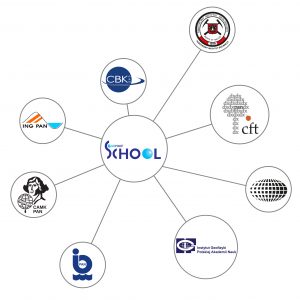
In Geoplanet doctoral school, students are affiliated and conduct research projects in one of the eight Institutes that established the School:
- Center for Theoretical Physics
Center for Theoretical Physics brings together researchers from various fields related to theoretical physics, astrophysics and natural sciences: classical and quantum field theory, quantum optics, basics of quantum mechanics and quantum information theory, physics of new states of matter, cosmology and astronomy. - Institute of Geography and Spatial Organization
The Institute is an important research centre in Poland in the fields of socio-economic geography (urban and population geography, geography of agriculture and rural areas, geography of industry, transport and services), physical geography (geomorphology, the Quaternary paleogeography, hydrology, climatology, geoecology and environmental protection) as well as political geography, cartography, spatial organization, local and regional development. - Institute of Geological Sciences
The institute conducts basic geological investigations concerning the origin and formation of rocks and minerals, evolution of selected orogens and reconstruction of ancient environments. Disciplinary areas of research interests include sedimentology, Quaternary geology, isotope geochemistry (especially geochronology), mineralogy, petrology, tectonics, stratigraphy, hydrogeology, paleontology and as well planetary geology. - Institute of Geophysics
A scientific institution representing the main stream of Polish basic research in Earth sciences. It is the leading institution in Poland that performs monitoring of geophysical fields in seismology, geomagnetism, and selected areas of atmospheric physics. The unique laboratories, including the Polar stations located behind both south and north polar circles, constitute perfect facilities for research on contemporary issues of the Earth magnetism, the Earth’s interior, lithosphere, hydrosphere and atmosphere. - Institute of Oceanology
Institute of Oceanology of the Polish Academy of Sciences is the largest marine-oriented research institution in Poland. The mission of the Institute of Oceanology Polish Academy of Science (IO PAN) is to seek, understand, and communicate the scientific understanding of the marine environment and the issues related to its protection and sustainable use. The IO PAN scientists and engineers achieve this by carrying out innovative, high-level scientific and technological research that further enhances our understanding of the environment, and provides expertise and new technologies which are then shared with interested parties from the public and private sector. - Nicolaus Copernicus Astronomical Center
Nicolaus Copernicus Astronomical Center is a leading astronomical institute in Poland. The main subjects of research include: stellar astrophysics, binary systems, circumstellar matter, dense matter and neutron stars, black holes, accretion processes, structure and evolution of active galaxies, cosmology, extrasolar planets. - Space Research Centre
The Space Research Centre is an interdisciplinary research institute of the Polish Academy of Sciences, established to conduct scientific research and activities: plasma and solar physics, Solar System physics, planetology, and astrophysics, Earth observations, satellite geodesy and technology, including photonics, micromechanics, electronics, mechatronics, and robotics, in order to develop the space technology and industry in Poland. - Polish Geological Institute – National Research Institute
It is the oldest Polish nation-wide scientific institution. It is involved in comprehensive studies of geological structure of the country for practical use in national economy and environmental protection. In addition to scientific activities in all fields of modern geology the Institute was entrusted with the tasks of the Polish Geological Survey and the Polish Hydrogeological Survey. Moreover, it is responsible for the country’s security in supply of mineral resources, the groundwater management, for monitoring of the geological environment and warning against natural hazards and risks.
